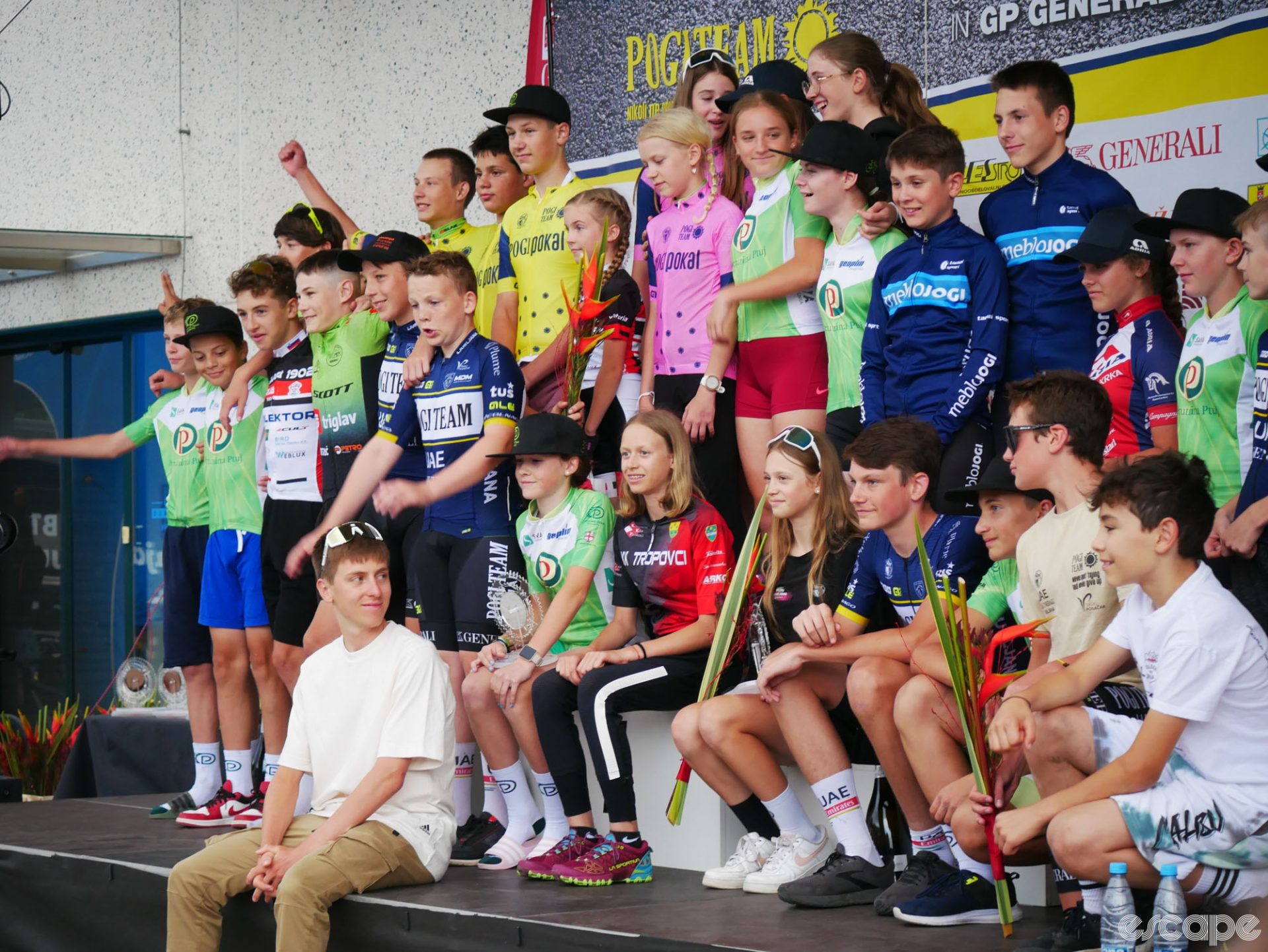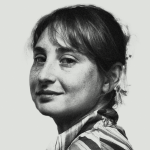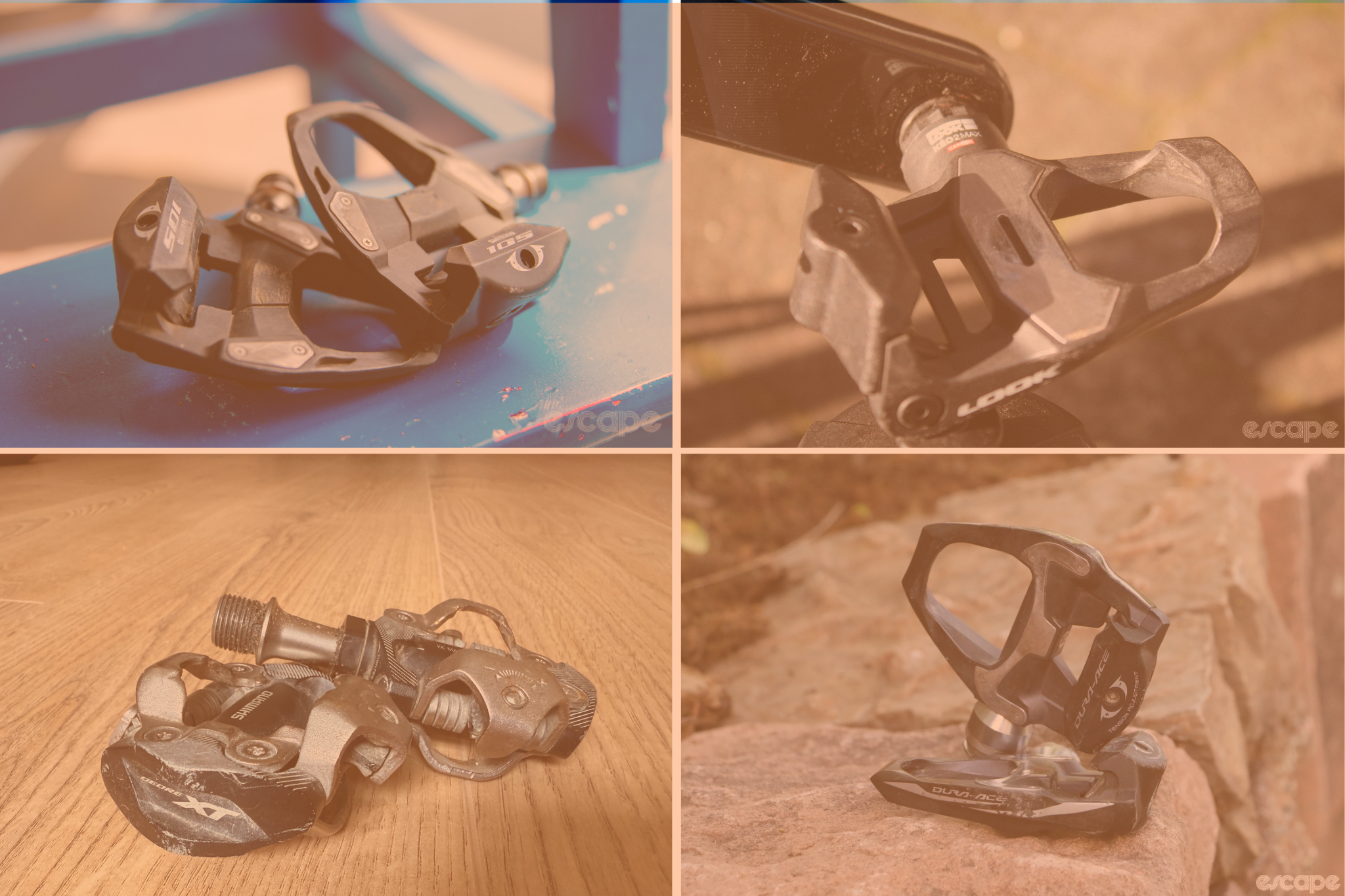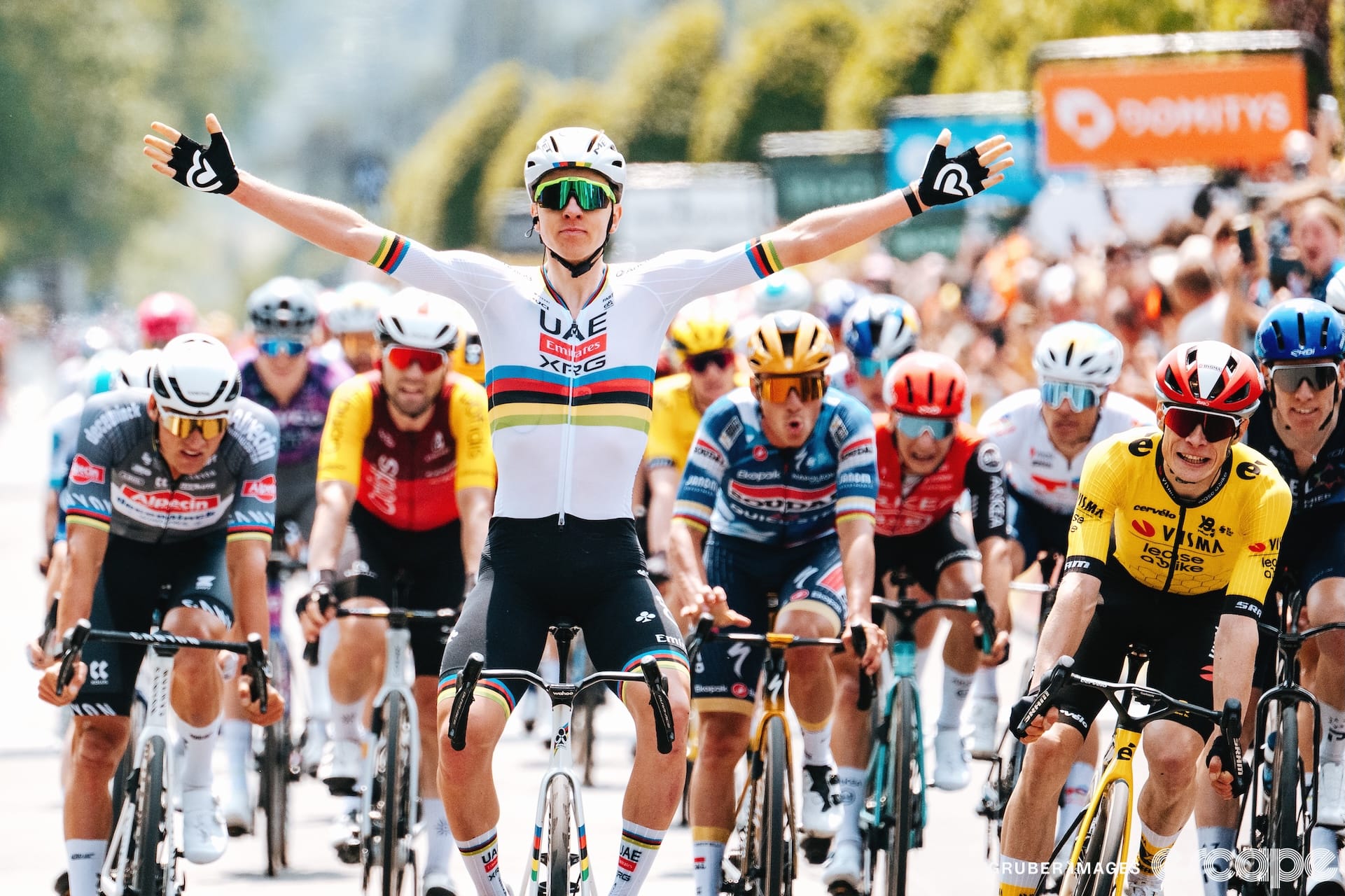One of the universal themes of bicycle racing across the world is the office-and-or-industrial park criterium. Slovenia is no different, except for the fact that you’ll find Tadej Pogačar hanging around and Domen Novak putting in a couple laps to warm up for the National Championships on Sunday.
The latest occasion in the local scene was the Pokal Tadeja Pogačarja, the Tadej Pogačar Cup, a circuit race taking place in the Komenda industrial park. Komenda, a sleepy town between Ljubljana and Kamnik, surrounded by the towering Kamnik Alps and the green and gold lowlands, is, of course, the hometown of Tadej Pogačar.
On Friday it was dark and cloudy outside, threatening rain but never quite following up on the threat. Teams from all around Slovenia descended upon Komenda and parked in the lots of logistics companies, distributors, and building materials suppliers. For spectators like myself, the atmosphere was a mix of party (there’s beer and music) and the informal chaos of a children’s sports meet not dissimilar to the tennis and softball matches of my own youth.
The attitudes of the cyclists could be described as deathly serious on the one hand and giddy and playful on the other. Half of sport, after all, is chilling with friends. Kids walked around with wicked tanlines, cellphones in the backs of their jersey pockets. A lot of BeReals were taken in cycling glasses. By the time I got there, the racing had been going on since the afternoon, beginning with the youngest categories (under 13) and leading up to the final elite/under-23 race. The circuit? A short lap around the surrounding area that takes the riders about a minute to pass through and they pass through it 40 times. One lap, the music would be Slovenian folk, the next “Welcome to the Jungle.” Such is the world of bike racing.
Sometimes the responsibility of a journalist is to deliver the Hard-Hitting Facts of team sport and sometimes it’s barely-concealed vibing in a parking lot. This event was the latter. Some of my colleagues from Slovenian television showed up to get sound bytes of Pogačar for the news. He wouldn’t be doing any other interviews and neither would Urška Žigart, who could be found chatting with friends and with Tadej’s parents. Tensions between the press and cyclists and staff are always high before the Tour de France, cycling’s elephant in the room. If anything, the circuit race was a way to cool off before Sunday’s championships, itself an appetizer to the grand boucle.
What follows, then, is an account of the Slovenian local scene writ large. And the vibes.
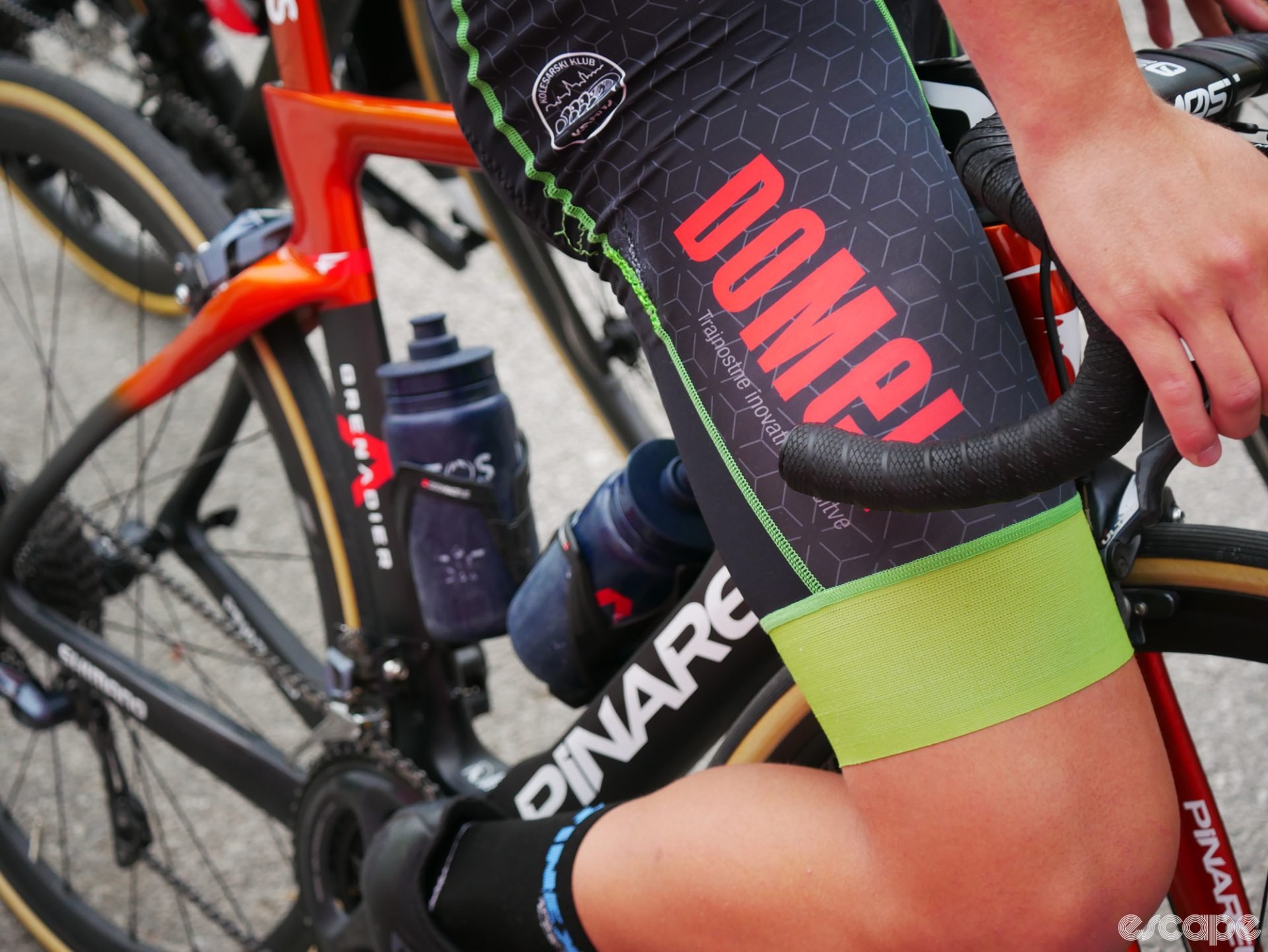
I think the most endearing element of juniors’ racing is the desire of young people to be like their heroes. They shave their legs. They wear their sunglasses at all times. They laze about on their top tubes with adolescent confidence. They mix their team kits with socks, helmets, and bottles from World Tour teams ranging from the obvious domains of Slovenia’s local legends (Jumbo Visma, Bahrain Victorious, UAE Team Emirates) to personal favorites (one wonders where the rider from Kolesarski Klub Kranj got a Pinarello Dogma complete with Ineos livery and bottles.) Some of the equipment is supplied by riders like Mohorič and Pogačar themselves. Old Bahrain bikes have an afterlife here. Pogačar has equipped his Pogi Team with a fleet of Colnagos with Prologo saddles. They wear his personal logo on their butt. Some equipment, however, is random, especially for the youngest riders who sit atop everything from Cippolini, Specialized, Wilier, Bianchi and Scott. They’ll take whatever bike fits that the teams have laying around or that their parents can afford.
Slovenian youth racing in all categories is and has historically been dominated by three clubs, a tripartite rivalry: Adria Mobil (from Novo mesto, a consistent WT talent incubator), KD Rog (the Ljubljana-based parent organization of Pogi Team, Ljubljana Gusto Santic, and the women’s teams UAE Team ADQ and BTC Ljubljana Scott), and KK Kranj (formerly Sava Kranj, the first home of Matej Mohorič). Each of these teams dates back to post-war Yugoslavia. In the current standings, Adria Mobil retains a slight edge through its roster of talents like Gal Glivar (not present Friday), veterans like Kristjan Koren, who raced eight Tours de France, and up-and-coming talent like Juniors track star Žak Eržen, son of Bahrain boss Milan and winner of Friday’s Juniors race. As further proof of the big three’s dominance, Ljubljana Gusto Santic won the men’s elite race with Anže Skok and KK Kranj’s Rok Bajželj took the prize in the Men’s U15.
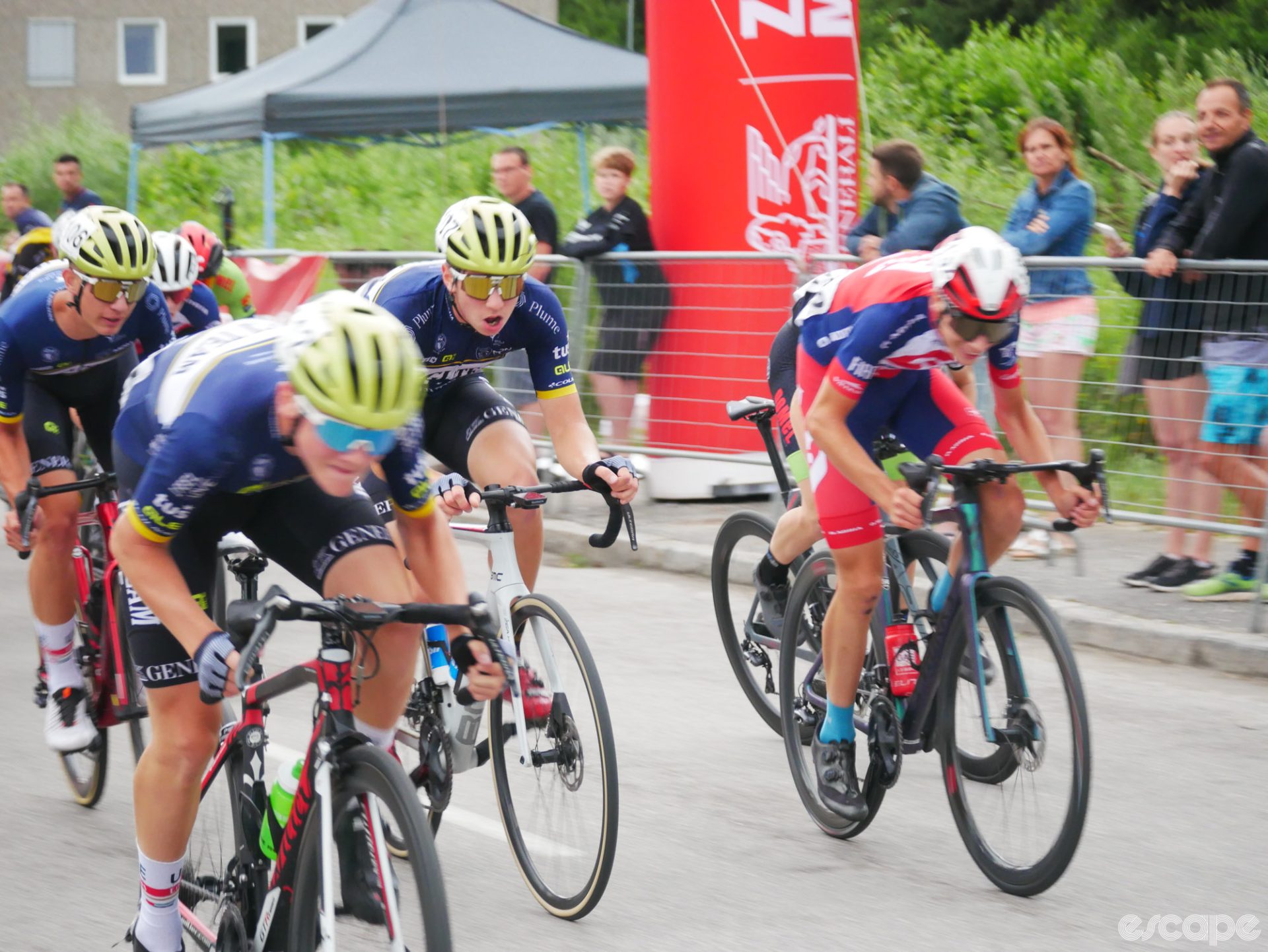
However, results in Slovenia are becoming increasingly more diversified as other teams receive increased funding and attention owing to cycling’s overall popularity boom in the country. Those teams include outfits like Perutnina Ptuj (home once to Borut Božič) and Meblojogi Pro Concrete. Assorted small clubs from Celje, Bled, and Postojna also make an appearance. In women’s cycling, BTC Ljubljana Scott remains by far the stronghold of the sport – its team made up the complete roster of the Women’s Elite race. Adria Mobil, Meblojogi Pro Concrete and Perutnina Ptuj have also developed women’s teams, and each of these took home prizes on Saturday.
Slovenians aren’t the only athletes present today, though. For two months, Escape Collective, for a feature piece to be published after the Tour de France, has been following the adventures of four Americans in Slovenia training with Pogi Team under the same staff that either rode with or trained Tadej Pogačar himself. One of those racers, Andrew Jackson “Quinn” McCurry of Alabama, finished 3rd in the Under-15 category. Vibing on his Wilier bike, still wearing his Pogi-certified SciCon sunglasses, Quinn, an expert storyteller, regales his epic battle:
"I started in the back and I was just, like, I need to get to the front of the group if I want to not get lapped. So, I finally move up to the first group and then I'm with them and people start breaking away and they're sprinting and I'm not really trying to keep up with them because I don't wanna waste my energy … And then they start getting real slow. And so as soon as they get slow I just bolt and then I'm in front of them for a little bit. I look behind myself and then I see one of my teammates, Franci [Krajnc]. And of course, he wanted to do good too so he brought the whole peloton with him…
Then on the last lap, we're in the middle of the peloton, because everybody's starting to sprint everything. I'm getting a little tight. And on that turn, I was trying to go around some people because I didn't wanna slow down and put on my brakes. I crash and then my chain comes off. And this dude is just trying to put it back on. It's taking forever. But he eventually gets it back on and I didn't notice that my shoe was undone. So my foot, so my foot was loose and so my foot almost went outta my shoe. I wasn't really thinking about it at the time. I just raced. The car never caught me and I somehow got third.”
Thus, the highs and lows of crit racing.
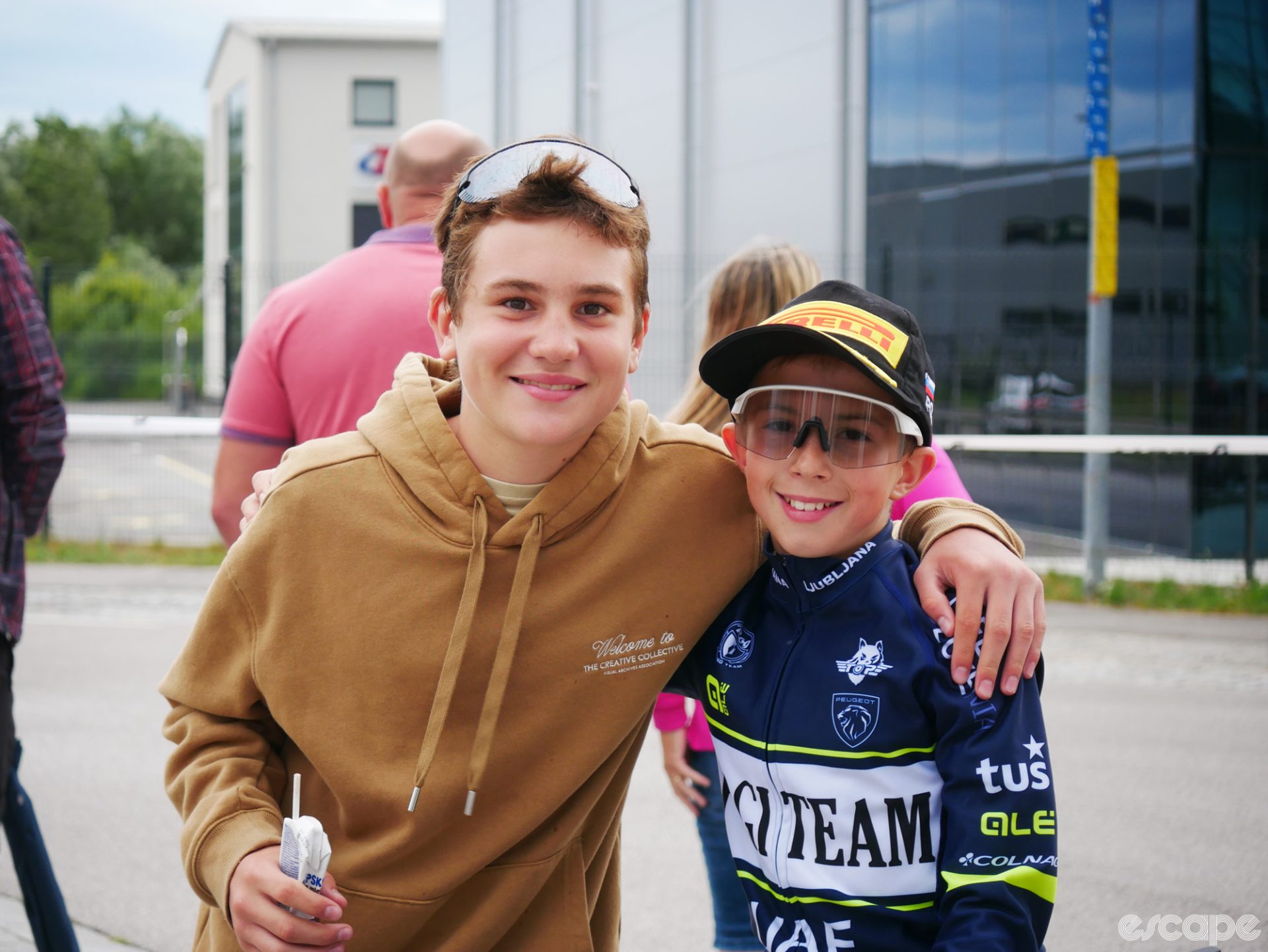
Right before the Juniors race, Pogačar showed up. He looked very small in an oversized tan t-shirt, and probably owing to a full work day, a little tired. He posed for a picture with the youngest kids and signed a Colnago bike to be raffled off as part of a sponsor deal with Telekom Slovenija. Saturday he’ll meet with the kids from Pogi Team for a one-on-one, something he described to me last year as being one of his favorite parts of his job.
Pogačar’s passion for youth racing is obvious and even through the formalities of sponsorship and photo ops, he watched from the sidelines with interest, chatting with Pogi Team coach and personal friend Blaž Debevec. He signed some kids’ helmets and met parents of Pogi Team children. For a short bit, he stood with retired GC-man Tadej Valjavec, whose son Erazem rode in the Juniors race for his new Italian team Autozai-Petrucci-Contri, finishing 5th. Then he got in a car with Andrej Hauptman and went home. There are probably many days in his life like this, half fun, half business.
After Skok won the Elite circuit, things settled down. The award ceremony lasted half an hour, in which little lucite trophies were handed out. Slovenian traditional music blasted on some speakers and everyone’s spirits lifted a bit, even those racers who couldn’t stick it out til the end and had to pull off to the side of the road. Parents drank tap beer and ate sausage. The race organizers, KD Rog, started taking down the haybales affixed to traffic signs. The racers went to their vans to change into civilian clothes. Half of them would see each other in a few days for bigger prizes.
The other half hope, and try their best, to get that far.
Did we do a good job with this story?

